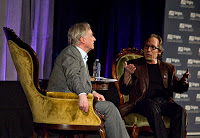Philosophy
 One of the most persistent intuitions we humans rely on when thinking about the question of the origin of the universe is captured by the latin phrase ex nihilo nihil fit, which can be roughly translated as "nothing comes from nothing," so where did everything come from?
One of the most persistent intuitions we humans rely on when thinking about the question of the origin of the universe is captured by the latin phrase ex nihilo nihil fit, which can be roughly translated as "nothing comes from nothing," so where did everything come from?
On the one hand, you can argue that since ex nihilo nihil fit, the universe, in one form or another, must be eternal and must have always existed. One potential problem with that point of view is the question of whether actual temporal infinities can really exist. On the other hand, the traditionally preferred answer has been: God did it. Of course, this answer doesn't explain anything, since it leaves the question of how even God could have created something (everything, in fact) from literally nothing, unsolved. Yes, God of the gaps argument, not a real solution.
But the question remains: where did the universe come from? And in the following fascinating, amusing and thought-provoking conversation, evolutionary biologist Richard Dawkins and theoretical physicist Lawrence Krauss tackle this and other equally important and interesting questions. Of particular interest is Krauss's distinction between the way scientists understand "nothing" from the way theologians understand the same word. It's a really interesting way of turning the question around on the believers. I wonder what you'll make of it...
Hope that leaves you with an intellectually satisfying weekend.
- Philosophy Versus Science
Julian Baggini interviewed physicist Lawrence Krauss in the Guardian on ?Philosophy v. Science: Which Can Answer the Big Questions of Life?. Baggini suggested that "We have no reason to think that one day science will make it unnecessary for us to ask...
- Everything And Nothing - Nothing
The idea of a vacuum, nothingness or the void has troubled Western thinkers since at least the time of Parmenides. The problem started as a logical puzzle: how could nothingness, something non-existent by definition, be? This rejection of the very possibility...
- Richard Dawkins: Growing Up In The Universe - The Ultraviolet Garden
Continuing his Michael Faraday Christmas Lectures, Growing Up in the Universe, Richard Dawkins begins by asking a seemingly simple question: what are living organisms (bees, for instance) for? The question seems so innocent that there is a very long tradition...
- L. Krauss And Cosmology
Looks like Lawrence Krauss [The Physics of Star Trek] has written a paper on man and cosmology. Abstract: Cosmological discoveries over the past century have completely changed our picture of our place in the universe. New observations have a realistic...
- Faith/science--mutually Exclusive?
Interesting. This is a prepublish paper by Richard MacKenzie. We are still fussing over the epistemological relationship between faith and science and it appears that people still wish to draw the conclusion that science and religion [theology] are mutually...
Philosophy
Richard Dawkins & Lawrence Krauss - Something from Nothing

On the one hand, you can argue that since ex nihilo nihil fit, the universe, in one form or another, must be eternal and must have always existed. One potential problem with that point of view is the question of whether actual temporal infinities can really exist. On the other hand, the traditionally preferred answer has been: God did it. Of course, this answer doesn't explain anything, since it leaves the question of how even God could have created something (everything, in fact) from literally nothing, unsolved. Yes, God of the gaps argument, not a real solution.
But the question remains: where did the universe come from? And in the following fascinating, amusing and thought-provoking conversation, evolutionary biologist Richard Dawkins and theoretical physicist Lawrence Krauss tackle this and other equally important and interesting questions. Of particular interest is Krauss's distinction between the way scientists understand "nothing" from the way theologians understand the same word. It's a really interesting way of turning the question around on the believers. I wonder what you'll make of it...
Hope that leaves you with an intellectually satisfying weekend.
- Philosophy Versus Science
Julian Baggini interviewed physicist Lawrence Krauss in the Guardian on ?Philosophy v. Science: Which Can Answer the Big Questions of Life?. Baggini suggested that "We have no reason to think that one day science will make it unnecessary for us to ask...
- Everything And Nothing - Nothing
The idea of a vacuum, nothingness or the void has troubled Western thinkers since at least the time of Parmenides. The problem started as a logical puzzle: how could nothingness, something non-existent by definition, be? This rejection of the very possibility...
- Richard Dawkins: Growing Up In The Universe - The Ultraviolet Garden
Continuing his Michael Faraday Christmas Lectures, Growing Up in the Universe, Richard Dawkins begins by asking a seemingly simple question: what are living organisms (bees, for instance) for? The question seems so innocent that there is a very long tradition...
- L. Krauss And Cosmology
Looks like Lawrence Krauss [The Physics of Star Trek] has written a paper on man and cosmology. Abstract: Cosmological discoveries over the past century have completely changed our picture of our place in the universe. New observations have a realistic...
- Faith/science--mutually Exclusive?
Interesting. This is a prepublish paper by Richard MacKenzie. We are still fussing over the epistemological relationship between faith and science and it appears that people still wish to draw the conclusion that science and religion [theology] are mutually...
